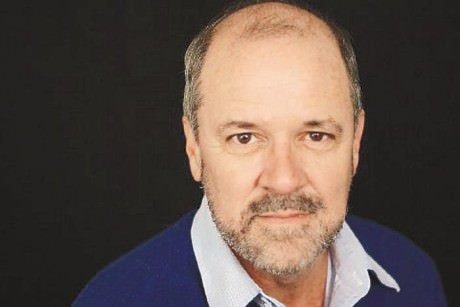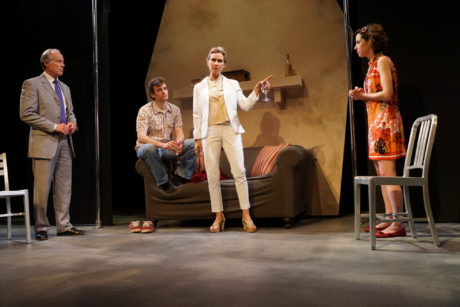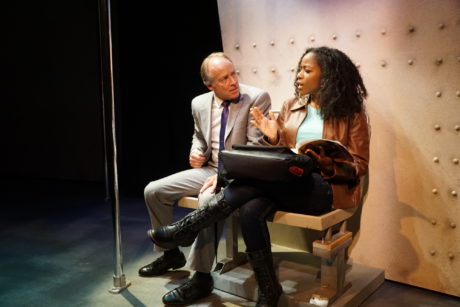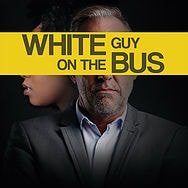Following its premiere at Chicago’s Northlight Theatre in 2015, White Guy on the Bus, a new work by Philadelphia’s prolific award-winning playwright Bruce Graham, comes to Passage Theatre in Trenton, NJ, and Delaware Theatre Company in Wilmington, before moving Off-Broadway to 59E59. The dark and disturbing drama considers the socio-economic inequities, raging anger, and lack of empathy that fuel racial discord, with no-holds-barred frankness and piercing insight. Prior to its opening, the always busy Graham, with four current productions of The Outgoing Tide running at theaters around the country and three commissioned plays in the works, sat down for an interview to consider his themes, approach, and process.
Deb: You had told me in a previous interview that many of the lines and themes in your plays come from real situations you’ve seen or conversations you’ve overheard on the sidewalks of Philadelphia. Was there a real-life inspiration for White Guy on the Bus, either that you observed personally or in the news?

Bruce: As with Coyote on a Fence, it came from an article I read years ago in a newspaper–I think it was in Pittsburgh–about how so many prisons are located far away, isolated from the general population. How do the families get there to visit? So a cottage industry of transporting poor people developed. I kept thinking about it, so I visited Rikers Island in New York; I took the bus and listened to the people on it. I was the only male over the age of eight, and the only white guy on the bus, though there were a few white women. The other passengers were looking at me; I didn’t fit into the usual demographic, so I thought I’d come up with a story to explain it. I’m not out to change the world, I’m an entertainer, but I thought there was a good human story here. I don’t think any of the characters in the play are evil, they just tell the truth. You don’t get anywhere by just stroking the audience, sometimes you need to get angry to make change.
Many of the issues you address in White Guy are similar to ones you’ve written about in your comedies, but here the structure is unique and the tone is much more tense, angry, and vitriolic, rather than laughable or clueless (except perhaps for Molly, who is so careful about being politically correct, yet lives a life that is completely out of touch with the other characters’ reality). Did you just want to switch it up as a writer, or are you responding to the general mood of our country and the city, which seems to be increasingly incendiary?
I’m always trying to switch it up as a writer. If you compare this structure to Stella and Lou, or According to Goldman, they’re straight narratives; some of my others are different, but I’ve never played with a timeline like this before. I was a little unsure about it, so I gave it to a few people to read, and they got it. I don’t write about the mood that the country is in, I write based on the mood I’m in; this is my form of therapy. I’ve never needed or seen a therapist, because I get my thoughts out in my writing–plus I would never tell a therapist anything anyway! But maybe subconsciously I do address the overall mood of what’s going on. So many writers just hang out with other writers and actors, but I still hang out with my old friends that I grew up with in school, with blue-collar roots. I’m not isolated within the theater community; it’s important to talk about things other than writing, which, to me, would be boring and tedious. The country is angry, and there is a real economic disparity here. People are actually fighting over the minimum wage, over paying workers enough to live on, so that their stocks can make more money and their shares can be worth more, when statistics show that raising the pay scale doesn’t in any way hurt the economy. It’s true that people who don’t study history are doomed to repeat it. In my new play, I have a quote from Clarence Darrow: “History repeats itself, and that’s one of the things that’s wrong with history.”
I know you don’t read reviews, but do you have a sense of how the play was received by audiences in Chicago, where it premiered? I assume it generated some serious discussion.
No, I don’t read reviews. I made the mistake of reading one that was hanging in the lobby in Chicago—obviously a good one, or the theater wouldn’t have posted it—and it just pissed me off, because the first line gave away the plot! I often know the tenor of my reviews by the comments and congratulations I get from my agent and the other people who read them. Stephanie [Bruce’s wife] slipped and mentioned something that was in a review, about me being “brave.” Brave is running into a burning building to save someone, not writing a play. With Funnyman, I asked her to read it, and her reaction was, “It’s so sad.” That’s what I was going for, so that’s all I wanted to hear. And then for my next play I wrote a comedy. But I love to see audiences leaning forward in their seats. In Chicago they had a talkback after every performance; a total of 3000 people attended–that’s pretty amazing! I didn’t go to any, but as far as I know, there was no controversy–though I was kind of hoping for some. But nobody said anything to me, and I heard that it actually generated very civil conversations about the theme and the characters. That was good, because I never write all evil or all good characters; that bores me. In Rizzo, I showed both sides of him; the good and the bad that we all have. I saw an interesting movie about Hitler, told from the perspective of his secretary. To her, he was a good boss; her view of him was personal, it had nothing to do with the bigger picture.
Have you attended any of the rehearsals in Trenton and made any suggestions, or are you relying solely on the stage directions in your script and the vision of the director?
I went to the first read-through, which is what I usually do. I answered a few questions they had and I made a few cuts. With a brand new play–which this was in Chicago–I’m there more, I went to rehearsals and was available in my hotel room through previews up till the opening, and then I left. But with Passage, I just talked to them once in a while. I think it’s important to stay away because you get a much more objective look at it when you see how others respond to the script and how they stage it. I might end up making a few edits, but not for this run.
Were you involved in any way with the casting of the Passage production, or in decisions about the director or artistic team?

It was the first time I worked with [Passage’s Artistic Director] June Ballinger, and I respect her. We each made initial suggestions for a director; I talked them on the phone and then told her to pick the one she wanted. She chose Michelle Tattenbaum, and I’m happy to say that when I was there in Trenton for the reading, we were on the same page. As I sat there listening, I would write notes to pass to her with my suggestions, but each time she’d make the adjustment I was going to suggest before she even got the note from me. I was in on the casting of Greg [Wood] and Susie [Susan Riley Stevens], since I know them well and have worked with them before, and also of Danielle [Leneé]; I was very impressed when I recently saw her in a show, and thought she was perfect for Shatique. Casting the two other roles, Christopher and Molly, was a little harder. I was in Rumors at Bristol Riverside Theatre, and couldn’t get up to New York to the auditions, so I left it up to the others. They have to be in the room with the actors, so I let them decide [they cast Laura Chaneski and Nate Washburn as the young couple]. It was very different at Act II, when they did According to Goldman at the beginning of this season; I wasn’t involved at all, so at the opening, I walked in blind to see the show, and I was very nervous about it. But as I was watching it, I started to relax, and I had a great time as an audience member; I thought it was one of the best productions of it that I’ve seen.
After Trenton, the show travels to Delaware in February 2017, and then to New York. What do you expect each theater to bring to the work that’s unique, or that you appreciate in their missions or signature approaches?
Every director has a different eye, and each production has a different design. I trust Bud [Martin, Executive Director at Delaware Theatre Company] implicitly; I’ve worked with him as both an actor and a playwright. I won’t work with a director who’s not actor or writer friendly. It’s only happened once in my life, but I don’t want to work with a director who makes me feel inhibited about my choices. Bud’s approach is to give me enough rope to hang myself, and then make suggestions after I see that some of it didn’t work; but don’t make me anxious or scared. Bud brought a mixed audience to hear a reading of White Guy, and afterwards one black woman said to me, “I am so sorry you had to write this play.” And all I could say was “thank you.” So Bud has been appealing to audiences, his ticket sales have been through the roof. I’ve been lucky to work with the theaters and directors I do; I’ve had very few bad experiences, and when I do, I don’t work with them again.
Do you have any expectations or hopes of what audiences will come away with from the play? Will it differ dramatically depending on the demographics? Will it help or exacerbate current tensions?
I think civil discussions always help, whether anybody’s mind is changed or not. And that’s what’s scary about the country now—so much narcissism, and a total lack of empathy. Sure, reactions will differ, as they do with every play. And that’s especially the case with so many of my works that are set in Philadelphia; it takes a few minutes for a non-Philadelphia audience to get into the context of the play. When you deal with the public, you’re exposed to a little bit of everything.
Are understanding and empathy ever truly possible for people of such polar opposite backgrounds and experiences? Or are we doomed to eternal conflict because of our differences? Is there a distinction between prejudice and the impossibility of being able to comprehend fully what it would be like to walk in someone else’s shoes?
It’s unfortunate that there is no “agree to disagree” anymore. I have friends with very different political beliefs than mine, I see it on their bumper stickers, and we just don’t talk about it. My personal beliefs can’t be reduced to a single line on a bumper sticker. This play is dark, and it was hard to write, but we can have a civil conversation. If people have the same decent core values, we can get along. But that doesn’t mean we can’t say, “Your belief is stupid” if it is. I’m sick of “we have to be so inclusive” and “we can’t say that”—yes, I can. Across the board, we’re all looking for an angle, or for an excuse, to be right. I don’t worry about that.
How different would the play and the reactions to it be if the antagonists were of the same race, or if their races were reversed? Why was important for you to write it as you did?

One of the big things I wanted to go for was privilege as opposed to need. Yeah, it’s there, and I do use the word “matter” in the script, I wanted to get it in there. Let’s face it: people are very flawed, but they do respond to the people they can best relate to, and if something happens to them. With White Guy, after I finished the script, I realized that there were more female characters than male—three women and two men. It’s not like I sat down intentionally to do that, to be politically correct or to prove what a ‘feminist’ I am; it just was how the play developed. In one play I’ve written, there were four guys and one woman; one has three women and one man, and another has a woman as the main character. As a guy, it’s not as easy for me to write a female character as it is a male, but I do it if it develops the story I’m telling.
What are you working on next?
I have three new plays coming up, all of which were commissions. South Coast Rep asked me to write something for them, with no strings, so I decided on the theme. It’s the third in my show biz trilogy, called Flickering Images—following Something Intangible and Funnyman. A Broadway producer also commissioned me to write a play with a general sports theme; I wrote it first to develop the characters, and now it needs a total teardown, to make a play out of them. And I’m doing a commission for Lantern on a very specific subject. Charles [McMahon, Co-Founding Artistic Director] approached me with an idea that I loved—though I’m not ready to talk about it yet. But all three are very different.
Thanks, Bruce; it’s always a pleasure to talk to you. I look forward to seeing all of your new works!
White on Guy on the Bus plays through Sunday, May 22, at Passage Theatre Company, performing at the Mill Hill Playhouse – 205 East Front Street, Trenton, NJ. For tickets, call the box office at (609) 392-0766, or purchase them online.






